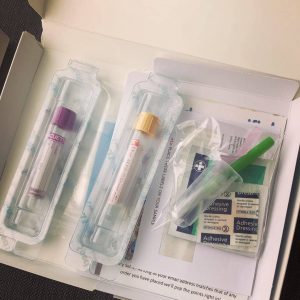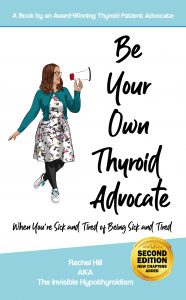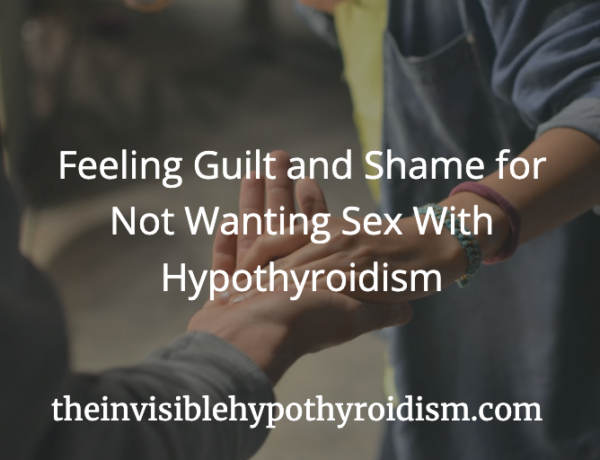What do you wish you were told at the start of your thyroid journey?
I asked my readers this very question and below are the most common responses, answered by myself for those who are perhaps new to understanding their hypothyroidism.
1. “Your Sleep Problems Could Be From Your Thyroid Condition.”
One of the lesser known signs of a thyroid condition can be sleep disruptions in the form of:
- Not being able to fall asleep.
- Feeling ‘Tired but wired’.
- Waking up frequently during the night.
- Waking up feeling unrefreshed or ‘more tired’ than when you went to bed the night before.
- Thyroid symptoms keeping you awake, such as muscle cramps and aches and pains.
- Sleep apnea.
- Night Sweats.
Low thyroid hormone levels, as well as the presence of thyroid antibodies can be to blame for night sweats, sleep apnea, overtiredness and muscle pains keeping you awake.
Many thyroid patients also find that they have some level of adrenal dysfunction alongside their thyroid condition, often in the form of high cortisol, which doesn’t help or even drives many of these complaints too.
Read more on tackling sleep issues here.
2. “Make Sure You Take Your Thyroid Meds and Take Them Correctly.”
Many of us are handed our first prescription for thyroid medication and sent on our way without any information on taking it correctly.
Reading the leaflet and box that your medication comes in is a good start. It will generally recommend that you should take it at least one hour away from any food or drink (excluding water) and medications, and four hours away from supplements and medications containing calcium, oestrogen, magnesium and iron (including antacids and antibiotics). Not doing so can affect how much of the thyroid hormone in your medication you absorb, meaning you’re not getting as much as you should be.
It is also worth noting that coffee has been reported to affect the absorption of T4-only thyroid medication which is why thyroid patients need to wait at least an hour after taking their meds before drinking any tea or coffee, too. [1]
I personally would avoid all caffeine within an hour of taking any thyroid medication, not just Levothyroxine, to be on the safe side. To get around this, an option could be to take levothyroxine medication at night. Some studies have shown that taking levothyroxine at bedtime may improve absorption. It also allows for you to have your morning cup of coffee without worrying about it affecting your thyroid medication. [2]
Is it also important to take your medication at the same time each day, check often that it is within date and not expired, never skip or miss doses (or stop taking it completely) and if you’ve been prescribed a specific brand or type of thyroid medication which is working for you, to make sure that you’re always given the same one, as some thyroid patients are given a generic substitute in place of their usual and end up feeling unwell again.
3. “You Need to Be Your Biggest Advocate.”
The answers to all the questions in this list have a common theme: advocate for yourself.
What does this mean? It means:
- Understanding your thyroid condition; what your medication is for, what blood tests you need, obtaining printed copies of test results and understanding how to interpret them.
- Learning which lifestyle changes you can implement to help yourself.
- Finding the right medical professional for you, because there are so many out there and they’re not all created equal when it comes to treating thyroid disease.
- Listening to your body and understanding what it is telling you; putting your foot down in situations that are not moving you towards better health.
Learn more in my book Be Your Own Thyroid Advocate.
4. “It’s More Than Just Taking a Pill Everyday.”
This is one I hear a lot.
We’re all initially told that we only need to take this one little pill a day and we’ll be right as rain before we know it.. yet many of us are left scrambling for support and advice when we take the thyroid medication, yet still feel unwell many months later.
After a little research, you will find a vast amount of information regarding the holistic view of our health many of us require in order to make bigger steps towards improved health and reduced symptoms.
This very website and its accompanying books, newsletters and social media pages talk all about this. All about how there are many ‘puzzle pieces’ we often need to address and put into place.
I’ve been a guinea pig myself, trying out many different interventions, supplements, protocols and what have you, figuring out which steps are actually important, without wanting to overwhelm us all!
My full list of the ‘jigsaw puzzle pieces’ can be see here, and includes things such as optimising your thyroid levels, diet, exercise, supplements and more.
5. “These Are the Signs Your Dosage Is Off.”
Being aware of signs your thyroid levels may be ‘off’ means that you can get them addressed as soon as possible and back to feeling good quicker too.
Here’s what to look out for:
- Getting sick more often
- Feeling fatigued all the time
- Thyroid symptoms such as fatigue, hair loss, cold sensitivity, constipation, muscle aches etc. starting to mount up again
- Your period changing – becoming irregular or heavier for example
- You’re having more thyroid flares
6. “Your Diet Can either Help or Hinder Your Recovery.”
Every single thing we eat and drink can either help us to improve our health (or maintain good health) or make it worse. When you realise the power of food, you start looking at it differently.
Treat food and nutrition like another important part of that thyroid jigsaw puzzle.
Eating well helps maintain good gut health as well as balanced blood sugar levels, which so many of us with thyroid disease also have issues with. It also helps to maintain crucial vitamin and mineral levels, which, if low can mimic thyroid symptoms such as fatigue, muscle pain and hair loss.
Some resources for this:
Article: What is The Best Diet for Hypothyroidism?
Article: Balancing Blood Sugar
The Cookbook: The 30-Minute Thyroid Cookbook: 125 Healing Recipes for Hypothyroidism and Hashimoto’s
7. “You Know Your Own Body. Be Persistent.”
A lot of people with hypothyroidism are told for years:
- “It’s all in your head.”
- “You’re fine.”
- “You’re just a busy parent.”
- “You just need more sleep.”
You may come across friends, family or even medical professionals who downplay your symptoms, try to convince you that they are caused by something else or just refuse to listen to your worries regarding your health and create actionable steps with you to resolve them.
Here’s the thing:
You know your body better than anyone else.
If you feel that something is ‘off’ or there is something else at play, there probably is.
I had been on Levothyroxine for months, yet still felt hugely unwell, despite doctors telling me that “Your levels are fine now, it must be a low mood problem. Have some antidepressants”.
For a while longer I assumed it must be just that, until I started delving deeper in to how thousands upon thousands of thyroid patients are still feeling unwell even on medication.
I unearthed a whole load of other issues, including the fact that the Levothyroxine wasn’t raising my low Free T3 level, and that I needed my levels to be optimised as opposed to just ‘within range’.
8. “You’ll Need Your Iron and Vitamin D Checking Too.”
A big piece of the puzzle are vitamin and mineral levels!
When diagnosed with a thyroid issue, it makes a lot of sense to do a vitamin workup too and assess whether low iron / ferritin, B12, Vitamin D, Folate etc. could also be contributing towards some of the fatigue, muscle aches and brain fog we often experience. A lot of symptoms crossover.
You doctor can check all of these, but I’ve included some online options too:
Vitamin D – UK and US test option here.
B12 – UK and US test option here.
Folate/Folic acid – UK and US test option here.
Ferritin – UK and US test option here.
Iron, T.I.B.C., Transferrin Saturation – UK and US test option here.
Magnesium – UK test here, US option here.
RBC Potassium – US test here.
9. “Prioritise Rest.”
People with thyroid conditions are renowned for being busy bees; overworking, overcommitting and overexercising. None of these help us to get out thyroid condition and symptoms under control, nor do they promote us keeping it under control.
Without enough downtime, rest, recuperation and sleep, we’re more likely to experience cortisol issues (adrenal dysfunction) which drive a lot of our symptoms. High cortisol levels in particular, appear to go hand in hand with hypothyroidism.
Do any of these sound familiar?:
- Struggling to fall asleep at night, or waking up a few hours after you do?
- Feeling more tired in the morning?
- Hitting a slump in the afternoon
- Anxiety?
- Have ongoing fatigue that affects your day to day life?
- Unable to tolerate stress?
- Hot flashes or sweats?
- Jumping or feeling irritable at loud noises?
- Been on thyroid medication for a while and still not feeling better?
- Brain fog?
- Extreme tiredness after exercise?
- Heart palpitations?
- Hair falling out?
- Muscle pain of unknown reason?
- Inability to concentrate or focus?
Order or ask for a 24 hour saliva test, testing your cortisol levels at four key points of the day, to find out if you have cortisol issues. If your doctor won’t order this, you can very simply order it yourself and complete it at home. You can find testing options here and here.
10. “You’re Not Crazy.”
Did you spend a good chunk of time undiagnosed with your thyroid condition wondering if what you were experiencing was normal or common?
You are not crazy. There is a reason why you feel the way you do. Keep on digging, keep on advocating for yourself and never settle for less than you deserve, which is good health and to enjoy life.
What do you wish you were told at the start of your thyroid journey?
See also:
The book Be Your Own Thyroid Advocate: When You’re Sick and Tired of Being Sick and Tired,the thyroid patient’s guide to getting on top of their hypothyroidism and Hashimoto’s.
References:
[1] https://www.ncbi.nlm.nih.gov/pubmed/28153426
[2] https://www.ncbi.nlm.nih.gov/pubmed/19584184










